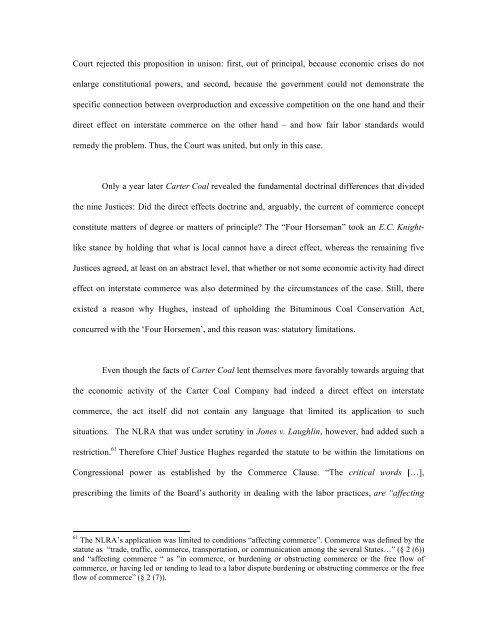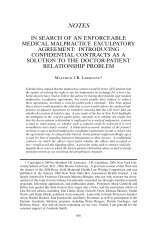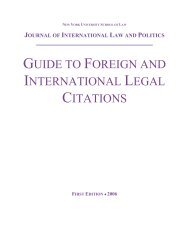Jasper Finke, Crisis and Law - New York University School of Law
Jasper Finke, Crisis and Law - New York University School of Law
Jasper Finke, Crisis and Law - New York University School of Law
You also want an ePaper? Increase the reach of your titles
YUMPU automatically turns print PDFs into web optimized ePapers that Google loves.
Court rejected this proposition in unison: first, out <strong>of</strong> principal, because economic crises do not<br />
enlarge constitutional powers, <strong>and</strong> second, because the government could not demonstrate the<br />
specific connection between overproduction <strong>and</strong> excessive competition on the one h<strong>and</strong> <strong>and</strong> their<br />
direct effect on interstate commerce on the other h<strong>and</strong> – <strong>and</strong> how fair labor st<strong>and</strong>ards would<br />
remedy the problem. Thus, the Court was united, but only in this case.<br />
Only a year later Carter Coal revealed the fundamental doctrinal differences that divided<br />
the nine Justices: Did the direct effects doctrine <strong>and</strong>, arguably, the current <strong>of</strong> commerce concept<br />
constitute matters <strong>of</strong> degree or matters <strong>of</strong> principle? The “Four Horseman” took an E.C. Knight-<br />
like stance by holding that what is local cannot have a direct effect, whereas the remaining five<br />
Justices agreed, at least on an abstract level, that whether or not some economic activity had direct<br />
effect on interstate commerce was also determined by the circumstances <strong>of</strong> the case. Still, there<br />
existed a reason why Hughes, instead <strong>of</strong> upholding the Bituminous Coal Conservation Act,<br />
concurred with the ‘Four Horsemen’, <strong>and</strong> this reason was: statutory limitations.<br />
Even though the facts <strong>of</strong> Carter Coal lent themselves more favorably towards arguing that<br />
the economic activity <strong>of</strong> the Carter Coal Company had indeed a direct effect on interstate<br />
commerce, the act itself did not contain any language that limited its application to such<br />
situations. The NLRA that was under scrutiny in Jones v. Laughlin, however, had added such a<br />
restriction. 61 Therefore Chief Justice Hughes regarded the statute to be within the limitations on<br />
Congressional power as established by the Commerce Clause. “The critical words […],<br />
prescribing the limits <strong>of</strong> the Board’s authority in dealing with the labor practices, are “affecting<br />
61 The NLRA’s application was limited to conditions “affecting commerce”. Commerce was defined by the<br />
statute as “trade, traffic, commerce, transportation, or communication among the several States…” (§ 2 (6))<br />
<strong>and</strong> “affecting commerce “ as "in commerce, or burdening or obstructing commerce or the free flow <strong>of</strong><br />
commerce, or having led or tending to lead to a labor dispute burdening or obstructing commerce or the free<br />
flow <strong>of</strong> commerce” (§ 2 (7)).
















